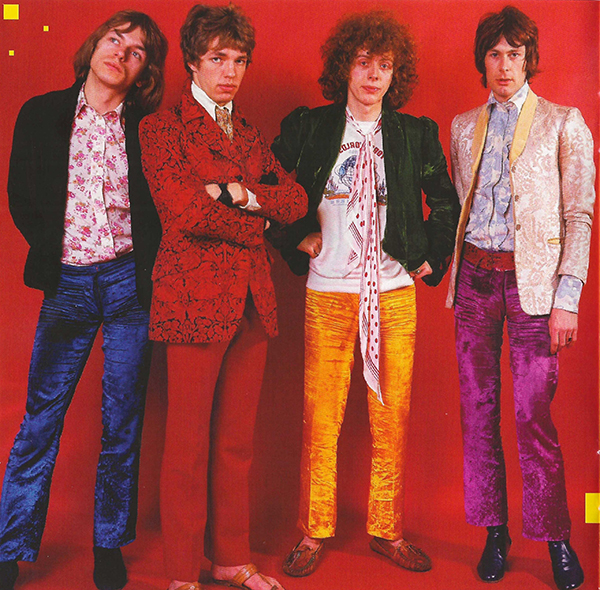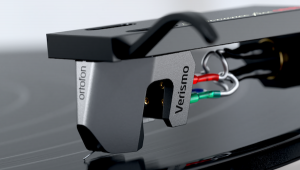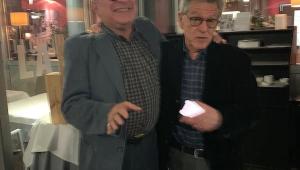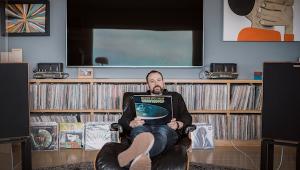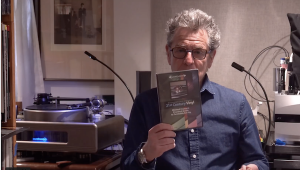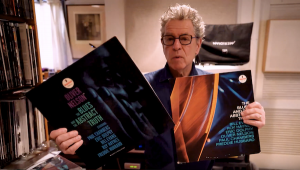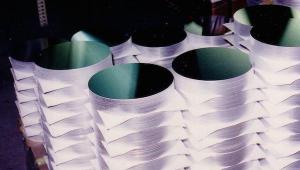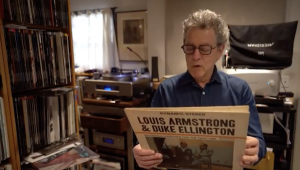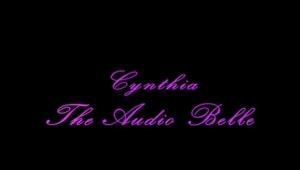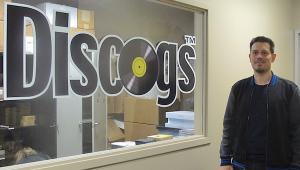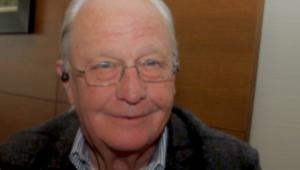Steve Howe Explores the Science Behind Having His Short-Lived 1960s Band Tomorrow Reimagined on Vinyl Today, Plus He Unveils Some Other Topographic Revelations From the World of Yes
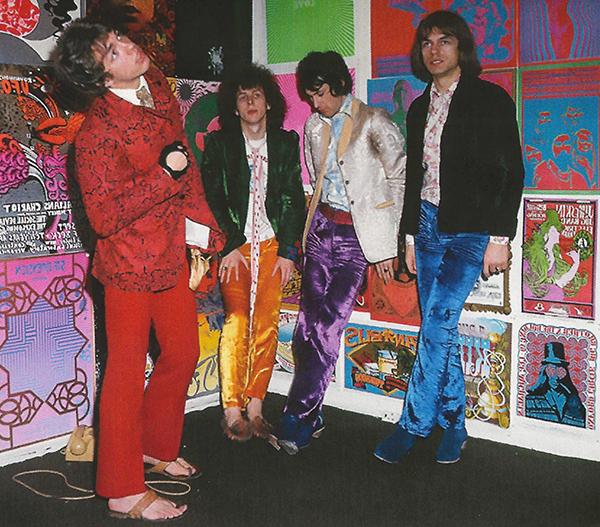
It’s never too late to reclaim your legacy on vinyl. British guitar icon Steve Howe knows this concept quite well, in fact, and it’s the main impetus for what you see here —namely, the full revamping of his pre-Yes 1960s band Tomorrow’s debut February 1968 LP, now duly recast and retitled Permanent Dream, which was released in its new, 140g 1LP form by Spirit of Unicorn Music/Parlophone on April 28, 2023. If you know anything about Tomorrow, you’ll probably recognize their signature single, “My White Bicycle,” which continues to stand out today as an amalgamation of intuitive British pop instincts, singalong harmonies, wound-up psychedelia, and balls-out garage rock, all rolled into one.
“The stereo Tomorrow CDs that came out from EMI some years ago [in January 1999], the ones with various versions of certain Tomorrow tracks — they all had a hodgepodge of the sound I really wanted to have with Permanent Dream,” Howe explains. “I wanted to create a continuity and excitement — a refreshing revisitation of what this album and what this band were all about on vinyl, because this sound is what we were all about.”
Per Tomorrow’s label and PR team, here’s additional phraseology about the reasoning behind this revamp: “The balance and edits [were done] to enhance and re-present what the band were trying to achieve 55 years ago.” Now officially renamed as the above-noted Permanent Dream, the album features “some less well-known studio tracks, a new title, running order, and sleeve creating the psychedelic masterpiece they always envisaged.”
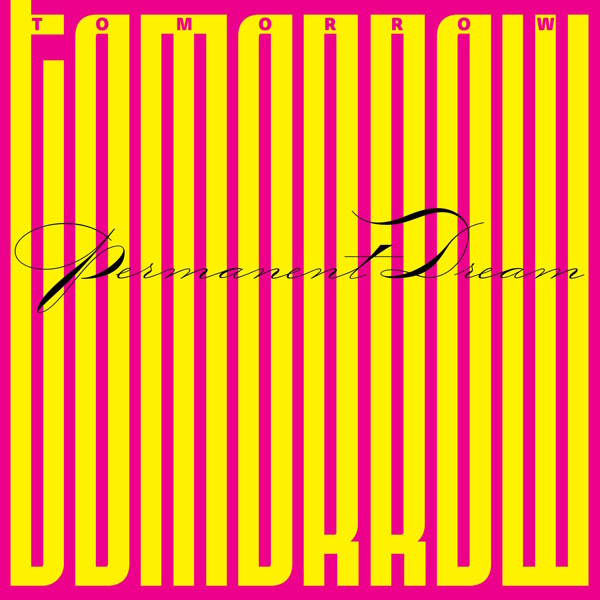
The 140g 1LP edition of Permanent Dream is available in a pair of options — either on violet color vinyl or standard black vinyl, both complete with the re-psychedelicized cover art as seen above, a new gatefold interior with full-size photos of the band on both halves, plus full lyrics and liner notes from Howe, vocalist Keith West, and drummer John “Twink” Alder on the inner yellow-and-pink sleeve.
The recording stats are these: Tomorrow’s original 1967 EMI Studios Abbey Road London recordings were produced by Mark Wirtz, and engineered by Geoff Emerick and Peter Brown. The 2022 “Reimagined” edition that’s now dubbed Permanent Dream and its related post-production are by Steve Howe, and it was engineered and remastered by Curtis Schwartz from the original mono mixes. Each version of the LP lists for £22.99, which translates to $28.95 U.S. at the time of this posting. You can order the LP as an import direct from the distributor, Cherry Red Records, right here.
And yes, just in case you’ve been wondering, a new studio Yes album is indeed imminently on the way — a 2LP set dubbed Mirror to the Sky, which is slated for release via InsideOut Music on May 19 — and Howe assures me we’ll speak again in the not-so-distant future about how that album came together. “It’s a nice opportunity to bring out some music that’s fresh and powerful from a happy band that makes records,” he confirms. “We still get on and develop music with the knowledge that there’s a good reason for Yes to continue. It needs to continue, and this music needs to come out.”
But in the meantime, it’s (mostly) all about the state of Tomorrow, as it stands today. In a recent Zoom interview, Howe, 76, and I discuss his “psychedelicized” impetus for revamping the original Tomorrow album, why the Permanent Dream tracklisting needed to be both revised and resequenced, and why the song that takes up the entirety of Side 1 of Yes’ iconic December 1973 double LP Tales From Topographic Oceans is actually shorter than it was intended to be. I’m not tired and it’s so late / Moving fast, everything looks great. . .
Mike Mettler: We last spoke in 2020 about your Love Is solo album, and I think that might actually be a good subtitle for Permanent Dream, because this seems to be a passion project you’ve finally been able to bring to light.
Steve Howe: Yeah! Yeah, I did reimagine that this album — which didn’t sound much like a psychedelic record — could sound like a psychedelic record by taking a few tracks off and putting a few others on, and getting the thing to kind of show the energy of the band.
Mettler: What did you use as your source material? Were you able to work with the original analog mono tapes?
Howe: Yeah. We waited a whole year or so for Warner Bros. to find the mono mixes, because I was convinced that’s what we needed — the original mono mixes. They were transferred to files, then they were sent to us, and then we had a chance to listen to the album truly as it was. I mean, I’ve got mono records, you know? (chuckles) But they weren’t really a good reference point.
Mettler: When the self-titled Tomorrow record came out in [February] 1968, were you satisfied with it, or were you like, “Okay, I guess I have to live with it”?
Howe: Well, to be honest with you, it was the first album I’d ever made. I’d done singles with The Syndicats and The In Crowd — and also with Tomorrow, for “My White Bicycle” as a single. [“My White Bicycle” was released as a 45 in the UK on Parlophone in May 1967.]
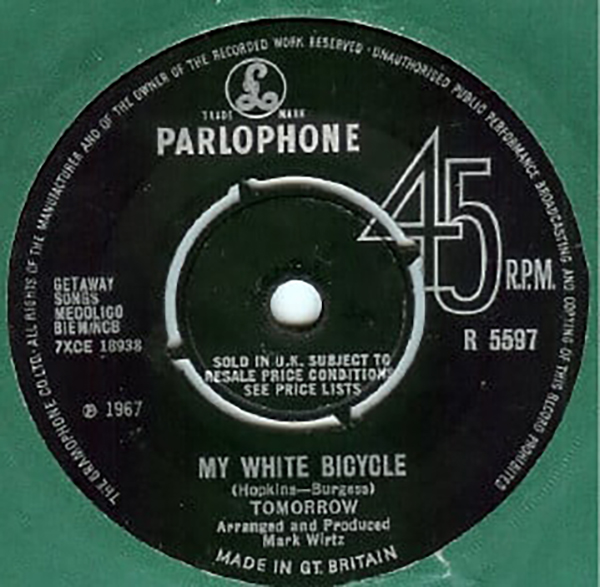
And, of course, before we knew it, people wanted more from us — but we hadn’t finished the album! So, basically, the album was just disappointing, really, because before we knew it, we kind of broke up in the middle of ’68, and there wasn’t really any real love for the album. I mean there was a lot of love for “My White Bicycle,” in the sense that we had that as a recording, and it had been out there. And then we released “Revolution” as a single as well [in September 1967], but by the time the album came out [the following February, in 1968], it was a bit late.
So, yeah, Tomorrow really did miss the boat — but it also didn’t really deserve to climb up the charts at that time. Although “My White Bicycle” is pretty classic, there wasn’t a cohesive connection between the songs like there was with [The Beatles’ June 1967 masterpiece] Sgt. Pepper, for instance. There wasn’t a cohesive strength between the numbers to make the leaps from them to be logical, and beautiful — and that’s really what I went about doing with Permanent Dream. I was trying to get a running order that went off sometimes but came back other times, and then it was centralized, and then it was a little bit like “Three Jolly Little Dwarfs” [now the last track on Side A] (laughs), so there were a lot nicer ingredients to sort of kick around.
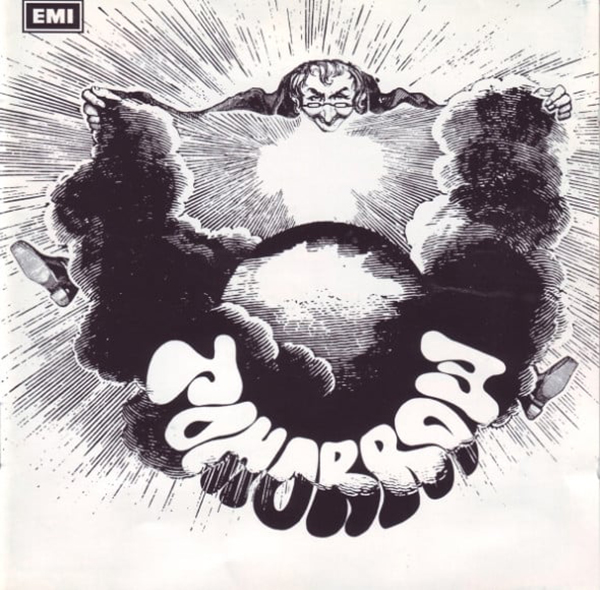
Mettler: I think you’ve nailed it right there, because I wrote down a key word after listening to Permanent Dream, and that word is sequencing. First, I listened to the original Tomorrow LP in the order that some of these songs appeared in previously, and then I listened to the new order, and it feels like it’s more of a two-sided record to me now. I have to imagine getting Permanent Dream specifically on vinyl like you’ve done here was very important to you, wasn’t it?
Howe: Well, it is! It’s beautiful when we take the time to listen to it on a record, you know? (laughs) But I confess that, yes, it’s very important to us that the record does sound good — and, obviously, it was checked with pre-release test pressings. We checked it, and we made sure — in fact, we had to recut some things. We fixed those things, like you do. And that’s why you have the test run on the vinyl, because there can be issues with it going onto vinyl. We weren’t expecting any, but we had one, so we fixed it — we went back, and redid it.
See, there is something you really can’t quite put your finger on when it comes to the bass. And it’s mostly in the bass. Just the fact that it is analog, and what you’re really hearing is analog, there are some problems with that. As you know, there can be some issues with the record going around with the needle on it, for sure — there can be some rumble, there can be some dust, and there can be some other problems.
But if those things are not happening, and you’ve got a nice deck to play them on and the record’s playing well, then this is the ideal way to hear music more or less as it would sound in the studio if we’d finished [the running order] like this. So, yeah, we paid a lot of attention to that side of it when it came to the new vinyl.
Mettler: Tomorrow was recording at EMI Studios on Abbey Road around the same time as The Beatles were working on Sgt. Pepper. Could you feel any of those vibes in the air like, “This is how we want our songs to sound”?
Howe: The vibe in the air was — well, I’d been doing sessions at EMI quite a lot as a session guitarist in between the groups I’d been in, so going back there to record Tomorrow was a great thing. And yeah, Paul [McCartney] and Ringo [Starr] once poked their heads around the door and said, “Morning!” — or something like that. We did creep down corridors and could hear bits of music that I can’t exactly remember what album they were, but they might have been The White Album, or on Abbey Road. The Beatles released their albums different from the order they recorded them, so it could have been Abbey Road we were hearing.
But anyway, it was also around the Sgt. Pepper time, of course, and The Beatles were so far ahead of everybody. We had so much respect and love for them. They were very nice and friendly guys at the time. Basically, there was a lot going on at that studio — all sorts of different kinds of music was being recorded.
It was a wonderful place and, yeah, we did have a nice time there. It was very, very hippied out. The fact that there’s a real policeman blowing his whistle on the album was just great fun for us to do. It was that kind of crazy time. You thought of something to do, and if it was possible, you’d do it. Why did it have to be a real policeman? Well, we just had to have a real policeman.
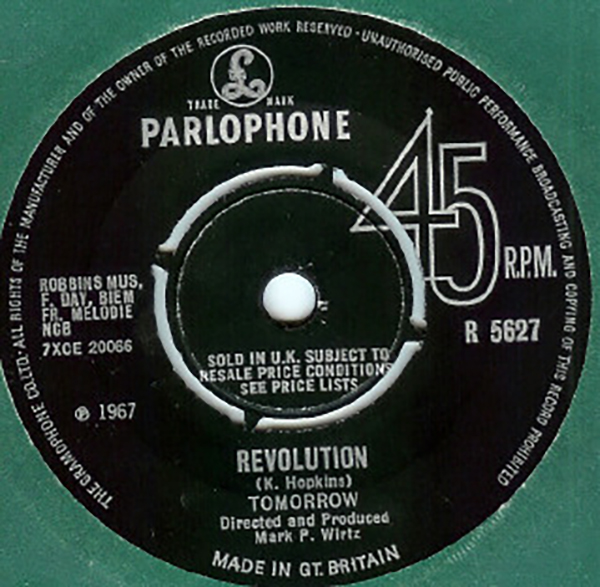
Mettler: Some of the tracks on the original Tomorrow album used a lot of phasing, but on this new LP, that effect seems to come across as being less extreme overall.
Howe: Yes. On “My White Bicycle,” we took out the bits that were moving across the stereo, which mixed it all up, and things like that. We just did a bit of phasing there. On “Revolution,” what we did was, we made it start slightly differently. We cleaned up all the “nows” because there were far too many of them. [“Now” is the word that’s being sung after the title word, “Revolution.”] Basically, we wanted all of it to be in tune and in time, and we fixed all the very, very bad edits that were done on there. We had to time-stretch various areas so that the continuity of the tempo is perfect — or as perfect as it can be with a band playing. (chuckles)
Basically, we tied the song up again. We made it right, and we got to fix the pitch, because we went from different studios. I mean, that orchestra was recorded — the little [mouths the orchestral melody] — that was recorded somewhere else, I think. Somewhere in there, it went a bit astray with the pitch and the tempos, and there wasn’t enough consistent watching being done on the editing. You know, it was early days for all this, but the regiment of time that we expect now on a song is very, very high. Whilst in the old days, even the early Yes records used to speed up quite a lot as they got on with it. (laughs) I mean, we don’t mind that, because we are not going to time-stretch in Yes. (laughs again)
But on Tomorrow, there was enough to fix. There were a few things on one track, and many things on another. We did subtle things too — like, we brought down harmony vocals that were a bit too loud, and then we brought up the drums when we felt they were lacking in presence and featuring.
We just tweaked the mono, using a device called RX 9, by a brilliant high-tech company [iZotope, in reference to the RX 9 audio editor]. It’s become RX 10 already. To me, this is a wonderful development of what you can do with something you thought you could not change at all. You’ve always been able to EQ a track, but now you can EQ the individual instruments, and you can really reassemble it to be like the same — but better! (chuckles)
The only thing it can’t separate a great deal at the moment is guitars and keyboards. Luckily, on Tomorrow, there are hardly any keyboards, so we had the ease of being, “this is a guitar trio with a singer” — and that’s mostly what we had. It was a pleasure to do it. it had to be done expediently, and that’s what we did. And we always work expediently. We don’t waste time. There’s no point in going in and wasting time — but there’s no point in rushing either, because if you rush, you won’t get anything done, you know? (laughs) It's a serious frame of thinking.
Mettler: Quite serious indeed! Well, I also like getting the cymbal work and other song elements more out front in “My White Bicycle.” I also like where, in the back half of “Why,” your guitar solo is also a bit more out front, which makes more sense in the context of what’s going on there.
Howe: That’s right, yeah. You gotta fill that space, and see how it works best. And sometimes, of course, we get what we get, but we change it to degrees. We certainly don’t want to upset anybody who loves it [i.e., the original version]. But there again, we did want to do this! (laughs) “Revolution” is the most improved track, if you like. It had — it needed the most doing to it, and it had the most doing to it.
But I think Tomorrow the band is quite remarkable in its ability for when we did “Strawberry Fields Forever” — and, of course, you can’t help but cover a Beatles song. We powered that up in some sort of distorted kind of way, which isn’t what I think I would do if I looked back and thought, “How do I play that song?”— but it’s wonderful.
I mean, the group Tomorrow has a kind of vibe. That was the vibe that was going on, and that’s what I wanted to string together from “Hallucinations” to “Caught in a Web,” which is a kind of a new thing, all tied up. We straightened up some titles too, because there are title mistakes on the album where, for example, “Now Your Time Has Come” was credited to the wrong song! (chuckles)
Mettler: That’s a problem certainly worth fixing, I agree. I also think “Caught in a Web” has more of a free-form jazz feel to it overall.
Howe: Right. Well, that’s what we realized when we dug it out and thought, “Now this is the song that’s called ‘Caught in a Web.’” We’ve re-established that song now as part of this album, because it was part of the album at one time.
I know it seems that we didn’t come up with these songs at the time, even though we did have them — but, you see, that was the sense of chaos, of rushing a little and trying to get a record finished when everybody was in love with “My White Bicycle,” but we didn’t have an album to go with it! (chuckles again)
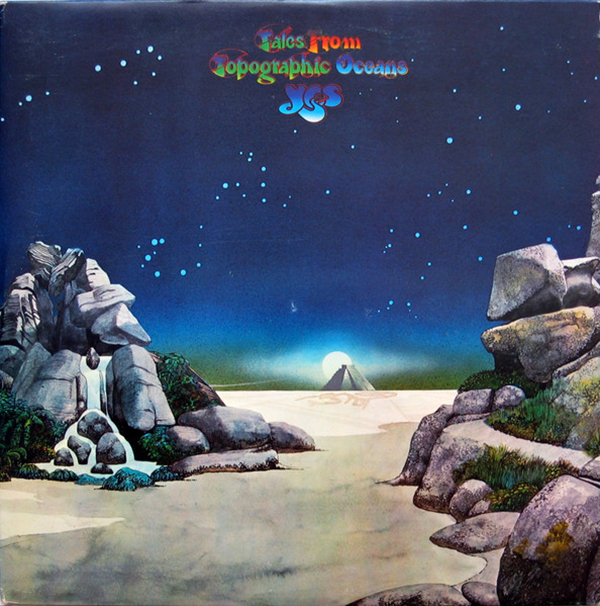
Mettler: I know we’ll be talking more specifically about Yes during our next conversation, but I did want to ask you briefly about Tales From Topographic Oceans [which was originally released as a 2LP set on Atlantic in December 1973]. It still boggles my mind to hear four super-long songs spread across four sides of vinyl like that. It’s also a wonder you were able to fit so much musical information on each side.
Howe: You know, I was looking at Tales the other week, and I was looking at Side 1 [which consists entirely of the 20-minute song, “The Revealing Science of God (Dance of the Dawn)”]. I was waiting for (quietly sings), “Dawn of light lying between a silence and sold sources” to start, and I was almost two minutes waiting because we’d discovered, when we did the mastering for that release — which is most probably one of the most special Yes releases — basically, we had a lot more going on there before that moment, and the reason that it wasn’t there was because it didn’t fit on! (laughs)
Side 1 went to over 24 minutes originally, and that wouldn’t fit on the record. So, we looked at it and said, “Well, where can we take something out?” The easiest place was at the beginning, so the record actually started on the button with “Dawn of light lying,” which I think is perfect. That’s really, really dramatic. But what we’re not used to is what really happened, which was the [mouths the instrumental intro portion with the water effects, keyboards, and guitar textures] — those sort of little melodic things going on for two minutes! (chuckles heartily)
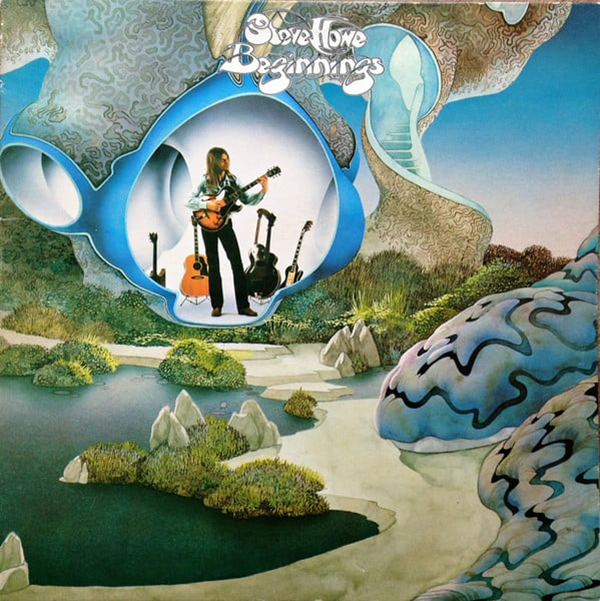
Mettler: Well, that’s such a special track in the Yes canon, however long it winds up being on vinyl, or elsewhere! (laughs) Anyway, I know we’re running short on time, so I’ll wrap things up with a theoretical thought here. The original Tomorrow record came out 55 years ago, but now I’d like to instead project us 50 years into the future, so it’s going to be 2073. You and I are probably not physically on the planet then unless there’s some weird science thing going on, but if somebody types your name, Steve Howe, into the search engine for however people listen to music 50 years from now, what do you want them to get out of that experience?
Howe: (chuckles) Well, the first thing that comes to mind is, I thought of Chet Atkins, because my playing has been so influenced by Chet that I’d like those listeners to hear songs like “Ram” [from his October 1975 solo album Beginnings], “Clap” [from his first album with Yes, February 1971’s The Yes Album], or “Diary [of a Man Who Vanished,” from his November 1979 solo album The Steve Howe Album], or whatever I’ve done on acoustic guitar where I’ve taken my Chet Atkins influence. The most direct thing they could do is to hear a country-picking tune, and maybe something from my forthcoming Motif Volume 2 album that’ll hopefully be out in the fall with some new tunes on it.
I’m also particularly fond of “Sketches in the Sun” [which originally appeared on May 1986’s GTR, and was later revamped acoustically on August 2008’s Motif Volume 1]. That’s a great place to start. Originally, it was on electric guitar, but then it was on 12-string acoustic, and now I play it on six-string acoustic so that I can really, really deal with the tune properly.
But, of course, the temptation might be that they should listen to something of Yes, because Yes is my most successful project — there’s no doubt about it. But the real me — the internal Steve Howe — he’s kind of a Chet Atkins clone, you know? (laughs heartily)

TOMORROW
PERMANENT DREAM
140g 1LP (Spirit of Unicorn Music/Parlophone)
Side A
1. Real Live Permanent Dream (Version One)
2. Hallucinations
3. My White Bicycle
4. Why
5. Revolution
6. Strawberry Fields Forever
7. Three Jolly Little Dwarfs
Side B
1. Now Your Time Has Come
2. Claramount Lake
3. Caught In A Web
4. Real Live Permanent Dream (Version Two)
5. The Incredible Journey Of Timothy Chase
